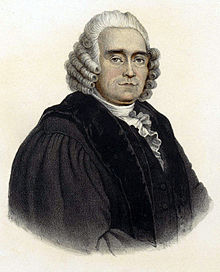Gualtherus van Doeveren
Gualtherus van Doeveren (also: Wolther van Doeveren, Wouter van Doeveren ; born November 16, 1730 in Philippine , † December 31, 1783 in Leiden ) was a Dutch physician.
Life
The son of the Flemish dike inspector Anthony van Doeveren and his wife Petronella de Haas had moved to the University of Leiden in 1747 after completing their training to study medicine. In Leiden he studied with Pieter van Musschenbroek , Frederik Bernard Albinus , Bernhard Siegfried Albinus , Hieronymus David Gaub , David van Royen and Frederik Winter . In 1752 he went on a study trip to Paris , where he attended lectures by Jean-Antoine Nollet , Antoine Ferrein (1693–1769), Jean Astruc , Jean Louis Petit (1674–1760) and André Levret . In the following year he returned to Leiden.
Here he acquired on October 21, 1753 with the Dissertatio de vermibus intestinalibus hominum praecipue de Faenia (Leiden 1754) the degree of doctor of medicine. His doctoral thesis was published in French in 1764 and was later translated into German. He then worked as a doctor in Leiden and developed such extraordinary skills that the curators of the University of Groningen noticed him. On March 18, 1754, they offered him a professorship at the university's medical faculty. Doeveren took up this office on June 11 of the same year with the speech Oratio de Imprudente raliocinio ex observationibus et experimentis Medicis . In Groningen he lectured on physiology, surgery, pathology and obstetrics.
After the death of Tiberius Lambergen , he became his successor in medical practice and clinical chemistry, while Petrus Camper took over his professorship in anatomy and surgery. He was also rector of the Groningen Alma Mater in 1761/62 and 1769/70. When he resigned from this office for the first time, he gave the speech Oratio de erroribus medicorum, sua utilitate non carentibus and the second time de sanitatis Groninganorum praesidiis ex urbis naturali historia derivandis (Groningen 1770; edited by Matthias Steevens van Geuns in Dutch translation) . But medical skills were soon recognized in Leiden too, so that in 1771, after the death of the famous Bernhard Siegfried Albinus, he was appointed professor of medicine and obstetrics at the University of Leiden.
He turned down a call to the University of Göttingen. Instead, on May 6, 1771, he took up the Leiden professorship with the speech de Recentiorum inventis Medicinam hodiernam Veteri praestantiorem reddentibus . Not unimportant was his rector's speech de remedio morbi, sive de malis, quae a remediis, sanandi caussa adhibitis, saepenumero hominibus accidere solent , given in 1778 and published in Leiden in 1779. After working in Leiden for twelve years, he died of gout. Doeveren was a strong advocate of vaccination. He was a member of several learned societies, including in 1766 the Dutch Academy of Sciences in Haarlem; in 1766 he was also elected a member of the Leopoldina . In 1781 he was appointed personal physician to Wilhelm V von Oranien-Nassau .
From his marriage in 1758 with Aletta Everhardina, the youngest daughter of the Groningen professor of law, Jakob Eck (1693–1757), there are three sons. The names Anton Jacob van Doeveren (* 1763; † October 30, 1805, doctor in Leiden and married to Elisabeth van Reverhorst), Kornelis Aemilius van Doeveren and Johannus Arnoldus van Doeveren are known.
Works
- Sermo Academicus de erroribus Medicarum sua utilitate non carentibus. Groningen 1762
- Specimen observationes academicarum ad monstrorum historiam anatomen, pathologiam et artem obstetriciam, praecipue spectantium. Groningen and Leiden 1765
- Sermo Academicus de sanitatis Groninganorum praesidiis ex urbis naturali historia derivandis. Groningen 1770
- Redevoering over the favorable gesteldheid van Groningen voor de gezondheid. Groningen 1771
- Epistola ad clarissimum Eduard Sandifort, de felici successu insitionis variolarum, Groningae institutae. 1770
- Primae lineae de cognoscendis mulierum morbis in usus Academicos. Leiden 1777, Leipzig 1786
literature
- Jacques Alexandre de Chalmot: Biographical woordenboek der Nederlanden. Verlag Johannes Allart, Amsterdam 1800, vol. 7, p. 291 ( online , Dutch)
- Matthijs Siegenbeek: Geschiedenis der Leidsche hoogeschool, van hare oprigting in the year 1575, dead het Jaar 1825. Verlag J. Luchtmans, Leiden, 1832, vol. 2, p. 219, ( online , Dutch)
- Pieter Gerardus Witsen Geysbeek: Algemeen noodwendig woordenboek der zamenleving. Verlag Gebrüder Diederichs, Amsterdam, 1836, 1st volume, p. 452, ( online , Dutch)
- Jan Christiaan Kobus, W. de Rivecourt: Biographical Handwoordenboek van Nederland. Someren Verlag, Zutphen, 1870, 1st volume, p. 445, ( Online , Dutch)
- Molhuysen: Wouter, of Verlatijnscht Gualtherus, van . In: Petrus Johannes Blok, Philipp Christiaan Molhuysen: Nieuw Nederlands Biografisch Woordenboek. (NNBW) Instituut voor Nederlandse Geschiedenis (ING), AW Sijthoff, Leiden, 1918, Vol. 4, Col. 418-423, (Dutch)
- Abraham Jacob van der Aa : Biographical woordenboek der Nederlanden, bevattende levensbeschrijvingen van zoodanige people, who zich op eenigerlei wijze in ons vaderland vermaard made. Verlag JJ Van Brederode, Haarlem, 1858, vol. 4, p. 233 ff., ( Online , Dutch)
- Willem Jozef Andries Jonckbloet: memorial book of the Hoogeschool te Groningen, which is located in the hair vijfde halve Eeuwfeest. JB Wolterus, Groningen, 1864, p. 80, ( Online , Dutch)
Web links
- Biographies, publications and academic family tree of Wouter van Doeveren at academictree.org
Individual evidence
- ↑ Member entry of Gualther van Doeveren at the German Academy of Natural Scientists Leopoldina , accessed on November 22, 2015.
| personal data | |
|---|---|
| SURNAME | Doeveren, Gualtherus van |
| ALTERNATIVE NAMES | Doeveren, Wolther van; Doeveren, Wouter van |
| BRIEF DESCRIPTION | Dutch medic |
| DATE OF BIRTH | November 16, 1730 |
| PLACE OF BIRTH | Philippine |
| DATE OF DEATH | December 31, 1783 |
| Place of death | Suffer |
